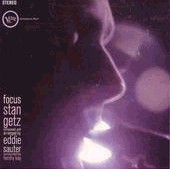Made up

I've owned this album for all of one a half weeks, but I can already safely say it's one of the greatest jazz recordings ever.
I should point out I have an absolutely miniscule collection of jazz, have never been to see jazz played live, and more or less stopped listening to it altogether for a while after suffering three years as pianist in the school jazz band - a position I occupied against my will on the orders of the decidedly non-hirsute Head of Maths who moonlighted as a jazz "buff" in his lunchhour.
Despite all this the jazz albums that I do own I love dearly. I'd read about 'Focus' being some kind of landmark in popular music (it was released in 1961) thanks to the way it mixed pure improvisation (Getz's saxophone) with a meticulously scored string orchestra (by Eddie Sauter). I already owned Getz's other two most famous albums, 'Jazz Samba' and 'Getz/Gilberto', so I kind of knew what to expect by way of personality and temperament; namely, the coolest and the smartest dressed saxophone player ever to come out of the United States. With strings.
I wasn't prepared, however, for the album's heady mix of classical sensibilities (order, structure, finesse) and popular emotion (tunes that bubble up from nowhere and stick in your head for ages). An inevitable commercial flop and critical masterpiece, 'Focus' has got some of the sharpest song titles around ('I Remember When', 'I'm Late I'm Late', 'A Summer Afternoon'), none of your over-lush American attitude that dictates "sax and violins" equals muzak, and can be the soundtrack for any mood you choose.
There isn't supposed to be any other piece of music like it in the world. But the crucial thing is it's not like that for the sake of it; it's not trying to be different and ending up self-conscious and arty and facile. It's unique and sincere at the same time, and I can think of few other recordings in the whole history of music that would fit that description.
I spend so much of my life surrounded by words - typing them, reading them, conjuring with them, arming myself with them - that to escape into such a distinctive confection of pure sound, one that's all the more potent for being mostly made up, is a welcome tonic.

